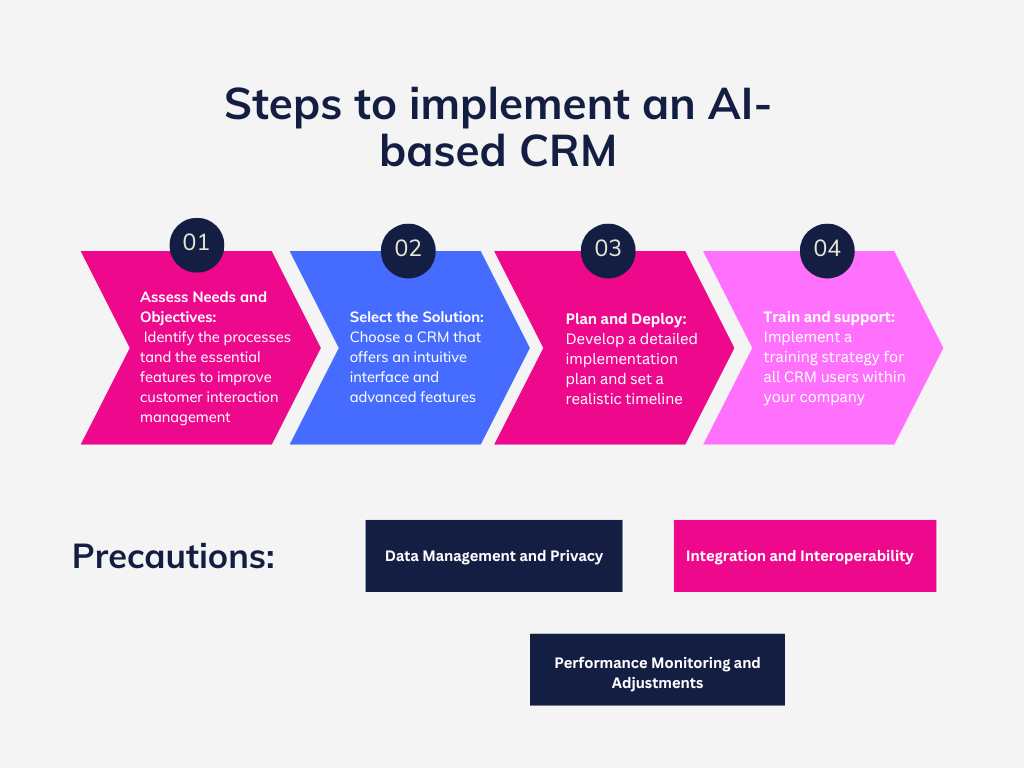In a world where technological innovation constantly redefines the standards of customer interaction, the integration of artificial intelligence (AI) into customer relationship management (CRM) systems marks a decisive turning point. AI CRM not only simplifies daily operations; it radically transforms how businesses connect with their customers, optimizing productivity and personalizing the user experience like never before. This evolution represents not only a major competitive advantage but also underscores the growing importance of machine learning and automation in enhancing companies’ ability to meet customer expectations.
This innovative perspective will be explored through various sections that will first delve into the foundations of CRM and AI, and then reveal how AI can be utilized for CRM. We will discuss the significant impact of AI on sales performance, highlighting the latest innovations in the CRM sector. Additionally, practical tips for implementing an AI-based CRM will be offered, concluding with the tangible benefits of this advanced technology.
Understanding CRM and AI
What is a CRM?
CRM, or customer relationship management, is an essential strategy for optimizing interactions and relationships between a business and its customers. These systems, often cloud-based, allow teams to track and analyze every interaction with customers and prospects. CRM is not just a technological tool but also a business philosophy aimed at strengthening customer ties to improve profitability. By recording information such as contact details, communication preferences, and past interactions, CRM creates a 360° view of customers, which is crucial for personalizing approaches and strengthening relationships. CRM management tools enable businesses to effectively manage customer data and interactions.
The basics of Artificial Intelligence
Since its conceptualization in 1956, artificial intelligence has evolved to become an indispensable component of many technological tools used today. AI allows for the analysis of massive volumes of data and provides real-time insights, which is particularly beneficial in CRM systems where a quick understanding of customer needs and behaviors can transform a company’s business approach. Advances in generative AI and deep learning have also enabled the development of systems capable of generating content and making autonomous decisions, enriching customer interaction with faster and more accurate responses. Some of the best AI platforms and AI tools for business include natural language processing, sentiment analysis, and predictive analytics.
AI at the service of CRM
Integrating artificial intelligence into CRM systems revolutionizes customer relationship management by offering advanced tools for analysis, automation, and personalization. AI in CRM enables capabilities such as data analytics, sales forecasting, lead scoring, and customer behavior analysis to drive data-driven decisions and personalized interactions.
Predictive analysis and scoring
AI enables in-depth predictive analysis, using models based on historical data to anticipate customer behaviors and sales campaign outcomes. For instance, AI-integrated CRM systems can predict the likelihood of a customer purchasing a specific product, helping to optimize marketing strategies and increase conversion rates. AI-driven lead scoring helps prioritize leads based on their likelihood to convert.
Data processing automation
AI-powered CRMs improve efficiency by automating data processing. This technology handles tasks such as updating customer profiles and detecting duplicates, allowing teams to focus on higher-value activities.
Intelligent customer segmentation
With AI, CRMs can perform more precise customer segmentation by analyzing vast datasets to identify specific behavioral trends. This capability allows for more effective targeting of marketing communications, aligning messages with the needs and preferences of different customer segments.
Personalization of customer interactions
AI enhances customer interaction by providing personalized recommendations based on behavioral analyses. This personalization strengthens customer engagement by offering relevant experiences and aligning offers with their specific expectations. AI for CRM enables personalized interactions at scale.
Optimization of sales processes
AI in CRMs facilitates the optimization of sales processes by automating tasks such as lead qualification and sales opportunity prioritization. Additionally, it enables real-time interactions with customers, improving the responsiveness and efficiency of sales teams. AI sales assistants can provide timely suggestions and insights to optimize the sales pipeline.
These innovations show how artificial intelligence transforms CRM, making processes more efficient and significantly improving the customer experience. The best AI software for CRM incorporates these AI-powered features to deliver an AI-enhanced CRM experience.
The impact of AI on sales performance
Integrating artificial intelligence into CRM systems profoundly transforms companies’ sales strategies. With advanced features, AI allows for increased personalization and better understanding of customers, resulting in significant improvements in commercial performance.
Increased conversions
AI’s automated assessment and prioritization of prospects enable the ranking of potential customers based on their likelihood of conversion and perceived value. By using machine learning algorithms to analyze data such as engagement history and online behavior, AI-equipped CRM systems optimize sales efforts by focusing on the most promising prospects, thus improving overall conversion rates. Furthermore, personalized marketing campaigns tailored to individual customer preferences increase the likelihood of successful conversions.
Improved customer retention
AI plays a crucial role in customer retention by enabling a deep understanding of their behaviors and preferences. AI-powered CRM systems leverage large amounts of data from email interactions, web analytics, and social media to identify predictive patterns that help anticipate customer needs. This ability to proactively predict and respond to customer expectations strengthens their engagement and loyalty, thereby reducing churn rates.
These AI innovations in the CRM field not only improve immediate interactions but also allow companies to make informed decisions on setting sales goals and resource allocation, thanks to accurate forecasts of sales and potential revenues. As a result, businesses can adjust their strategies in real time to maximize efficiency and achieve sustained growth.
AI innovations in the CRM sector
In the CRM sector, integrating cutting-edge artificial intelligence technologies leads to significant innovations that transform customer interactions. Among these advances, voice recognition and the integration of the Internet of Things (IoT) stand out for their impact on the personalization and efficiency of services.
Voice recognition
AI-powered voice recognition allows for more natural and intuitive interaction with CRM systems. Customers can now express their needs and requests by speaking directly to the interface, simplifying processes and enhancing the user experience. This technology not only recognizes words but also understands the context and nuances of language, enabling better comprehension of customer intentions and more precise and personalized responses.
IoT integration
Integrating IoT into CRM systems represents another major innovation. Connected devices provide a continuous stream of real-time data, allowing companies to gain a more accurate and current overview of customer behaviors and preferences. This abundance of data enriches customer profiles in CRMs, facilitating finer segmentation and increased personalization of communications and offers. Moreover, IoT enables immediate responsiveness to customer needs, thereby improving their satisfaction and loyalty.
These innovations, supported by artificial intelligence, optimize CRM operations and strengthen relationships between businesses and their customers, offering a more connected and personalized experience.
How to implement an AI-based CRM
Key Steps:
- Assess Needs and Objectives: Before starting, it is crucial to clearly define the specific needs of your business and the goals you want to achieve with an AI-powered CRM. This step includes identifying the processes to be optimized and the essential features needed to improve customer interaction management.
- Select the Solution: Choose a CRM that can be customized to fit your workflows and offers an intuitive interface along with advanced features such as process automation and data analysis. Consider the best AI CRM software options and conduct a CRM comparison to find the right fit for your business.
- Planning and Deployment: Develop a detailed implementation plan that includes the steps to follow, necessary resources, and the responsibilities of each team member. Set a realistic timeline to avoid delays and ensure the tool is deployed consistently across the entire company.
- Training and Support: Implement a training strategy for all CRM users within your company. Each user should receive training tailored to their role and responsibilities to ensure successful adoption and effective use of the tool.
Precautions to Take:
- Data Management and Privacy: Data privacy is a major concern. Ensure that data is secure and that privacy policies are in place to protect sensitive customer information.
- Integration and Interoperability: Examine how the new CRM will interface with other existing tools. It is essential for systems to be interconnected to avoid errors and redundant entries. Check the clarity of the vendor’s API to facilitate necessary integrations.
- Performance Monitoring and Adjustments: After deployment, it is crucial to listen to user feedback and analyze the CRM’s performance. Use relevant indicators to evaluate sales efficiency, customer satisfaction, and overall performance, and make necessary adjustments to optimize tool usage.
By following these steps and precautions, you can maximize the benefits of an AI-based CRM and significantly improve customer relationship management in your company.

Microsoft Dynamics CRM
Microsoft Dynamics 365 is at the forefront of AI integration, redefining how organizations interact with their customers. This cutting-edge technology offers a suite of features designed to enhance customer engagement, optimize sales strategies, and reshape traditional customer management approaches. Microsoft Dynamics CRM’s Customer Insights tool revolutionizes interactions by unifying and updating customer data in real time, enabling highly personalized experiences and a deep understanding of customer needs and preferences.
AI-powered chatbots in Dynamics CRM can handle basic customer requests, significantly reducing the workload of customer service teams. Beyond managing requests, AI in Dynamics 365 CRM offers advanced tools for data analysis and insight generation. By analyzing interaction patterns and customer preferences, AI helps businesses tailor their services and communications to meet each customer’s unique needs.
As a preferred partner of Microsoft, Prodware sets up specialized teams to support its clients at every phase of CRM project implementation. Learn more about Microsoft Dynamics 365 and feel free to contact our experts!






